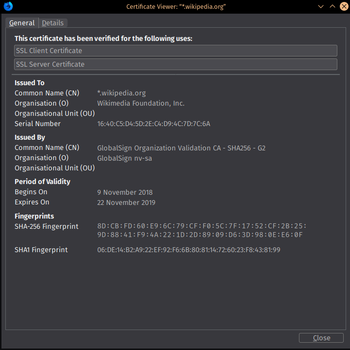Generate Rsa Public Key From Modulus Exponent
16.12.2020 admin
Mac os high sierra generate csr and export key. How to generate public/private key in C#. Asymmetric cryptography also known as public-key encryption uses a public/private key pair to encrypt and decrypt data. In.NET, the RSACryptoServiceProvider and DSACryptoServiceProvider classes are used for asymmetric encryption. RSA key formats are defined in at least RFC 3447 and RFC 5280.The format is based on ASN.1 and includes more than just the raw modulus and exponent. If you decode the base 64 encoded ASN.1, you will find some wrapping (like an object identifier) as well as an internal ASN.1 bitstring, which decodes as.
- Aug 06, 2015 How can I generate a public key using given modulus and exponent? Create public key from component of modulus and exponent #43. Closed xavieryao opened this issue Aug 6, 2015 8 comments Closed Create public key from component of modulus and exponent #43. Xavieryao opened this issue Aug 6.
- The RSA problem is defined as the task of taking eth roots modulo a composite n: recovering a value m such that c ≡ m e (mod n), where (n, e) is an RSA public key and c is an RSA ciphertext. Currently the most promising approach to solving the RSA problem is to factor the modulus n.
Takes a RSA public key modulus and exponent in base64 encoding and produces a public key file in PEM format

Jun 15, 2015 Hi guys, I've been wracking my brain for weeks on RSA encryption and it turns out the key I had isn't the key at all, its an exponent and I need to use the exponent and modulus I have to generate a key, however it doesn't seem (from what I've found) that Apple has a way of doing that in iOS. Feb 13, 2014 node-rsa-pem-from-mod-exp Create RSA Public Key PEM from Modulus and Exponent value in node.js. There are no dependencies to other modules for use. This allows you to use the modulus/exponent values for validating signed value.
Makefile
| CC = clang |
| CFLAGS = |
| DEPS = |
| OBJ = modexp2pubkey.o |
| LIBS = -lssl -lcrypto |
| %.o: %.c $(DEPS) |
| $(CC) -c -o $@$<$(CFLAGS) |
| modexp2pubkey: $(OBJ) |
| $(CC) -o $@$^$(CFLAGS)$(LIBS) |
| .PHONY: clean |
| clean: |
| rm -f *.o |
modexp2pubkey.c

| #include<string.h> |
| #include<openssl/rsa.h> |
| #include<openssl/evp.h> |
| #include<openssl/bn.h> |
| #include<openssl/pem.h> |
| // cheating, . ignoring deprecation warnings |
| #pragma GCC diagnostic ignored '-Wdeprecated-declarations' |
| unsignedchar *base64_decode(constchar* base64data, int* len) { |
| BIO *b64, *bmem; |
| size_t length = strlen(base64data); |
| unsignedchar *buffer = (unsignedchar *)malloc(length); |
| b64 = BIO_new(BIO_f_base64()); |
| BIO_set_flags(b64, BIO_FLAGS_BASE64_NO_NL); |
| bmem = BIO_new_mem_buf((void*)base64data, length); |
| bmem = BIO_push(b64, bmem); |
| *len = BIO_read(bmem, buffer, length); |
| BIO_free_all(bmem); |
| return buffer; |
| } |
| BIGNUM* bignum_base64_decode(constchar* base64bignum) { |
| BIGNUM* bn = NULL; |
| int len; |
| unsignedchar* data = base64_decode(base64bignum, &len); |
| if (len) { |
| bn = BN_bin2bn(data, len, NULL); |
| } |
| free(data); |
| return bn; |
| } |
| EVP_PKEY* RSA_fromBase64(constchar* modulus_b64, constchar* exp_b64) { |
| BIGNUM *n = bignum_base64_decode(modulus_b64); |
| BIGNUM *e = bignum_base64_decode(exp_b64); |
| if (!n) printf('Invalid encoding for modulusn'); |
| if (!e) printf('Invalid encoding for public exponentn'); |
| if (e && n) { |
| EVP_PKEY* pRsaKey = EVP_PKEY_new(); |
| RSA* rsa = RSA_new(); |
| rsa->e = e; |
| rsa->n = n; |
| EVP_PKEY_assign_RSA(pRsaKey, rsa); |
| return pRsaKey; |
| } else { |
| if (n) BN_free(n); |
| if (e) BN_free(e); |
| returnNULL; |
| } |
| } |
| voidassert_syntax(int argc, char** argv) { |
| if (argc != 4) { |
| fprintf(stderr, 'Description: %s takes a RSA public key modulus and exponent in base64 encoding and produces a public key file in PEM format.n', argv[0]); |
| fprintf(stderr, 'syntax: %s <modulus_base64> <exp_base64> <output_file>n', argv[0]); |
| exit(1); |
| } |
| } |
| intmain(int argc, char** argv) { |
| assert_syntax(argc, argv); |
| constchar* modulus = argv[1]; |
| constchar* exp = argv[2]; |
| constchar* filename = argv[3]; |
| EVP_PKEY* pkey = RSA_fromBase64(modulus, exp); |
| if (pkey NULL) { |
| fprintf(stderr, 'an error occurred :(n'); |
| return2; |
| } else { |
| printf('success decoded into RSA public keyn'); |
| FILE* file = fopen(filename, 'w'); |
| PEM_write_PUBKEY(file, pkey); |
| fflush(file); |
| fclose(file); |
| printf('written to file: %sn', filename); |
| } |
| return0; |
| } |
Openssl Modulus
Sign up for freeto join this conversation on GitHub. Already have an account? Sign in to comment